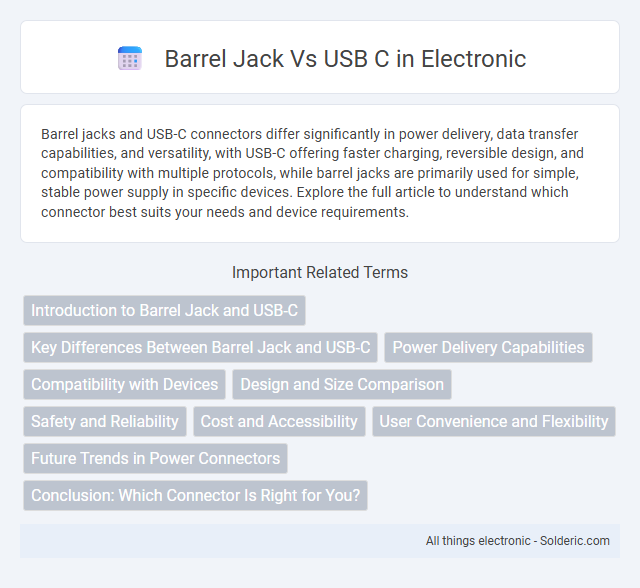Barrel jacks and USB-C connectors differ significantly in power delivery, data transfer capabilities, and versatility, with USB-C offering faster charging, reversible design, and compatibility with multiple protocols, while barrel jacks are primarily used for simple, stable power supply in specific devices. Explore the full article to understand which connector best suits your needs and device requirements.
Comparison Table
| Feature | Barrel Jack | USB-C |
|---|---|---|
| Connector Type | Cylindrical, two-pin | Reversible 24-pin connector |
| Power Delivery | Typically 5V-24V DC, limited current | Up to 100W (20V, 5A) with PD protocol |
| Data Transfer | No data support | Supports USB 2.0, 3.1, Thunderbolt, video |
| Durability | Medium, prone to wear | High, reversible and durable design |
| Usage | Traditional power supply for laptops, devices | Power, data, video for modern electronics |
| Compatibility | Requires specific adapters | Widely adopted, standardized |
| Size | Larger and bulkier | Compact and slim |
Introduction to Barrel Jack and USB-C
Barrel jacks are cylindrical power connectors commonly used to supply DC power to laptops, routers, and other electronic devices, known for their simplicity and reliability. USB-C is a versatile, reversible connector standard that supports data transfer, video output, and power delivery up to 100 watts, making it ideal for modern electronics like smartphones, laptops, and tablets. The transition from barrel jacks to USB-C reflects a shift towards multifunctional ports that enhance connectivity and streamline device compatibility.
Key Differences Between Barrel Jack and USB-C
Barrel jacks provide a simple, reliable power connection commonly used for DC power in devices, featuring a cylindrical shape with distinct polarity, while USB-C offers a versatile, reversible connector supporting both power delivery up to 100W and high-speed data transfer. USB-C integrates advanced communication protocols enabling dynamic power negotiation, fast charging, and connectivity for video and audio, contrasting with the straightforward power-only function of barrel jacks. Your choice depends on device requirements for power efficiency, data transfer capabilities, and physical design preferences, with USB-C being increasingly favored in modern electronics.
Power Delivery Capabilities
USB-C supports advanced Power Delivery (PD) protocols, enabling fast charging with power outputs up to 100W, making it ideal for a broad range of devices from smartphones to laptops. Barrel jacks typically offer lower, fixed voltage and current ratings, limiting flexibility and slower charging speeds. Your choice of connector directly impacts charging efficiency and device compatibility, with USB-C providing superior power delivery capabilities.
Compatibility with Devices
Barrel jack connectors are primarily compatible with older laptops, routers, and various power adapters, often requiring specific voltage and polarity matching for each device. USB-C provides universal compatibility across modern smartphones, tablets, laptops, and peripherals, supporting power delivery and data transfer with standardized protocols. The widespread adoption of USB-C simplifies charging and connectivity by enabling a single cable for multiple device types, whereas barrel jacks necessitate different chargers for different devices.
Design and Size Comparison
Barrel jacks feature a cylindrical design with varying diameters and lengths, making them bulkier and less versatile compared to USB-C connectors. USB-C offers a compact, reversible design measuring approximately 8.4mm by 2.6mm, ideal for modern slim devices requiring efficient space utilization. Your choice should consider USB-C's smaller footprint and enhanced data/power capabilities over the traditional barrel jack's larger, single-purpose interface.
Safety and Reliability
USB-C connectors offer enhanced safety features with built-in overcurrent and overvoltage protection, reducing the risk of device damage compared to traditional barrel jacks. Barrel jacks can be less reliable due to loose connections and potential polarity reversal, which may lead to safety hazards or power inconsistencies. For your devices, choosing USB-C ensures a more robust and secure power delivery system, improving overall reliability and safety.
Cost and Accessibility
Barrel jacks are generally more affordable and widely available in basic electronics, making them cost-effective for low-power devices. USB-C connectors offer higher functionality and universal compatibility but typically come at a higher price due to advanced technology and growing demand. The increasing adoption of USB-C in consumer electronics improves accessibility despite its initially higher cost compared to traditional barrel jacks.
User Convenience and Flexibility
USB-C offers superior user convenience and flexibility compared to barrel jacks, featuring a reversible connector that simplifies plugging in devices. USB-C supports power delivery, data transfer, and video output through a single port, reducing the need for multiple cables and adapters. Barrel jacks are limited to power supply only, making USB-C the preferred choice for modern, versatile device connectivity.
Future Trends in Power Connectors
Future trends in power connectors emphasize USB-C due to its versatility, higher power delivery capabilities up to 100W, and rapid adoption in consumer electronics, enabling faster charging and data transfer. Barrel jacks remain common in legacy and industrial devices but are gradually being replaced as USB-C supports standardized protocols and reversible design. Innovations in USB-C technology, such as Power Delivery (PD) and integration in portable devices, position it as the dominant connector for future power solutions.
Conclusion: Which Connector Is Right for You?
Choosing between a barrel jack and USB-C depends on your device requirements and usage context. Barrel jacks deliver stable, high-voltage power ideal for larger electronics, while USB-C offers versatile power delivery, high-speed data transfer, and compatibility with modern devices. For compact, multifunctional gadgets, USB-C is the preferred choice; for dedicated power supply needs with less emphasis on data, barrel jacks remain reliable.
Barrel jack vs USB C Infographic

 solderic.com
solderic.com